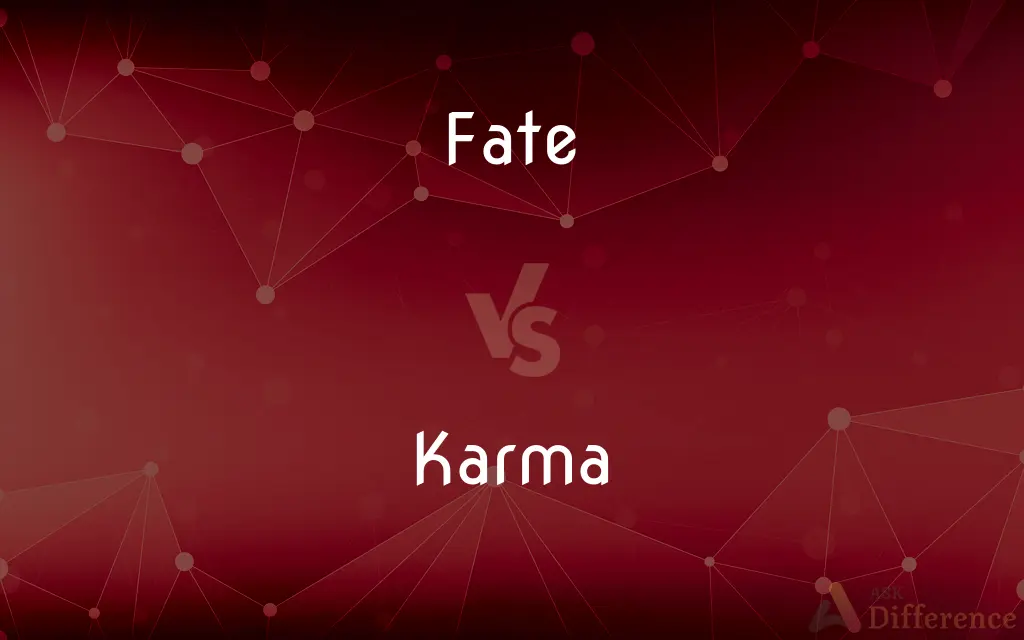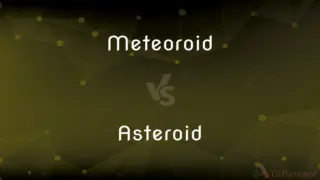Fate vs. Karma — What's the Difference?
By Tayyaba Rehman & Fiza Rafique — Updated on April 16, 2024
Fate refers to a predetermined course of events often seen as inevitable, while karma involves actions influencing future circumstances based on moral causality.

Difference Between Fate and Karma
Table of Contents
ADVERTISEMENT
Key Differences
Fate is a concept often associated with a predetermined course of events that one cannot alter, typically seen as guided by a cosmic or divine force. Karma, on the other hand, is rooted in the idea that one's actions determine one's future, both in this life and in reincarnations; it is a fundamental tenet in many Eastern religions, including Hinduism and Buddhism.
While fate implies a lack of control over one's destiny, suggesting that events are set in stone and cannot be changed, karma suggests a dynamic cycle of cause and effect where personal choices impact future outcomes. This implies a degree of moral responsibility and ethical living, as good deeds lead to positive results and bad deeds to negative ones, whereas fate is often seen as unavoidable regardless of one's actions.
In the context of literature and mythology, characters destined by fate often encounter inevitable outcomes, such as in the tales of Greek tragedy where heroes face downfalls orchestrated by the gods. In contrast, stories involving karma often focus on characters evolving or suffering according to their actions, highlighting moral lessons and the importance of ethical behavior.
Understanding fate and karma impacts personal belief systems and influences how individuals perceive life challenges and successes. Those who believe in fate might see life's events as predetermined and beyond control, while those who believe in karma might view life as a series of moral tests that shape one’s spiritual journey.
The philosophical debates between fate and karma also touch on issues of justice and fairness, with karma providing a framework where every action has a corresponding reaction, thus supporting a cosmic sense of justice. Fate, however, does not necessarily cater to notions of desert or moral outcomes, often leading to a resignation towards life’s unpredictability.
ADVERTISEMENT
Comparison Chart
Definition
Predetermined and unchangeable course of events
Actions determine future outcomes based on moral causality
Control
Implies no control over outcomes
Suggests control through ethical actions
Philosophical Basis
Often linked with divine or cosmic will
Rooted in moral responsibility and ethical causality
Examples in Culture
Greek tragedies, where characters cannot escape their destinies
Eastern philosophies where life is shaped by one's deeds
Impact on Life View
Promotes a view of life as predetermined
Encourages active moral engagement in life
Compare with Definitions
Fate
Often associated with divine or cosmic forces.
In many cultures, fate is intertwined with the will of gods.
Karma
Acts as a self-regulating mechanism within the universe.
Karma maintains balance by ensuring justice through causality.
Fate
Seen as unalterable and inevitable.
Fate decreed that he would rise and fall in life.
Karma
Fundamental in Hinduism and Buddhism.
Karma dictates that every action has consequences.
Fate
Frequently linked to destiny or predestination.
Fate had chosen her to be the hero of the story.
Karma
Believed to affect one's future lives as well as the present.
Karma is thought to carry over into future reincarnations.
Fate
A predetermined course of events beyond human control.
Oedipus's fate was sealed by prophecies foretold.
Karma
A principle where intent and actions influence future happiness.
His generosity led to good karma and eventual rewards.
Fate
Central in many Western philosophies and literature.
Shakespeare often explored fate in his tragedies.
Karma
Encourages moral responsibility and ethical living.
She lived a life of honesty, hoping for good karma.
Fate
The supposed force, principle, or power that predetermines events
Fate did not favor his career.
Karma
Karma (; Sanskrit: कर्म, IPA: [ˈkɐɽmɐ] (listen); Pali: kamma) means action, work, or deed. The term also refers to the spiritual principle of cause and effect, often descriptively called the principle of karma, wherein intent and actions of an individual (cause) influence the future of that individual (effect): good intent and good deeds contribute to good karma and happier rebirths, while bad intent and bad deeds contribute to bad karma and bad rebirths.The philosophy of karma is closely associated with the idea of rebirth in many schools of Indian religions (particularly Hinduism, Buddhism, Jainism and Sikhism), as well as Taoism.
Fate
The inevitable events predestined by this force
It was her fate to marry a lout.
Karma
(in Hinduism and Buddhism) the sum of a person's actions in this and previous states of existence, viewed as deciding their fate in future existences.
Fate
A final result or consequence; an outcome
What was the fate of your project?.
Karma
The totality of a person's actions and conduct during successive incarnations, regarded as causally influencing that person's destiny.
Fate
Fates Greek & Roman Mythology The three goddesses, Clotho, Lachesis, and Atropos, who control human destiny. Used with the.
Karma
The law or principle through which such influence is believed to operate.
Fate
The presumed cause, force, principle, or divine will that predetermines events.
Karma
Fate or destiny resulting from one's previous actions
“[The pitcher] had mostly avoided damage through the first four innings despite putting at least two runners on base three times, but he could not hold back the bad karma any longer” (Ben Shpigel).
Fate
The effect, consequence, outcome, or inevitable events predetermined by this cause.
Karma
(Informal) A distinctive aura, atmosphere, or feeling
There's bad karma around the house today.
Fate
An event or a situation which is inevitable in the fullness of time.
Karma
A force or law of nature which causes one to reap what one sows; destiny; fate.
Fate
(mythology) Fate (one of the goddesses said to control the destiny of human beings).
Karma
(uncommon) A distinctive feeling, aura, or atmosphere.
Fate
(biochemistry) The products of a chemical reaction in their final form in the biosphere.
Karma
(internet) A score assigned to a user or post on some discussion forums, indicating popularity or perceived value.
Fate
(embryology) The mature endpoint of a region, group of cells or individual cell in an embryo, including all changes leading to that mature endpoint
Karma
One's acts considered as fixing one's lot in the future existence.
Fate
(transitive) To foreordain or predetermine, to make inevitable.
The oracle's prediction fated Oedipus to kill his father; not all his striving could change what would occur.
Karma
The doctrine of fate as the inflexible result of cause and effect, especially the principle by which a person is rewarded or punished in a subsequent incarnation for deeds in the previous incarnation; the theory of inevitable consequence.
Fate
A fixed decree by which the order of things is prescribed; the immutable law of the universe; inevitable necessity; the force by which all existence is determined and conditioned.
Necessity and chanceApproach not me; and what I will is fate.
Beyond and above the Olympian gods lay the silent, brooding, everlasting fate of which victim and tyrant were alike the instruments.
Karma
One's destiny; fate.
Fate
The element of chance in the affairs of life; the unforeseen and unestimated conitions considered as a force shaping events; fortune; esp., opposing circumstances against which it is useless to struggle; as, fate was, or the fates were, against him.
A brave man struggling in the storms of fate.
Sometimes an hour of Fate's serenest weather strikes through our changeful sky its coming beams.
Karma
The supposed non-physical emanations that a person gives off, which may affect other people; vibrations.
Fate
The three goddesses, Clotho, Lachesis, and Atropos, sometimes called the Destinies, or Parcæwho were supposed to determine the course of human life. They are represented, one as holding the distaff, a second as spinning, and the third as cutting off the thread.
Karma
(Hinduism and Buddhism) the effects of a person's actions that determine his destiny in his next incarnation
Fate
An event (or a course of events) that will inevitably happen in the future
Fate
The ultimate agency that predetermines the course of events (often personified as a woman);
We are helpless in the face of Destiny
Fate
Your overall circumstances or condition in life (including everything that happens to you);
Whatever my fortune may be
Deserved a better fate
Has a happy lot
The luck of the Irish
A victim of circumstances
Success that was her portion
Fate
Decree or designate beforehand;
She was destined to become a great pianist
Common Curiosities
How does karma work across different lives?
In beliefs that accept reincarnation, karma from previous lives affects one's current circumstances and future reincarnations.
What role does karma play in moral education?
Karma teaches that ethical behavior leads to positive outcomes, thereby promoting moral conduct.
Is fate always negative?
Not necessarily; fate can be positive or negative, depending on the cultural context and the specific circumstances described.
Can one escape their fate?
Traditionally, fate is seen as inescapable and unchangeable, integral to its definition.
Does believing in fate affect personal motivation?
Belief in fate might decrease motivation for some, as they feel outcomes are predetermined, while it might comfort others by providing a sense of order.
How do people influence their karma?
People can influence their karma through their actions, intentions, and ethical decisions.
What is the difference between fate and predestination?
Fate and predestination are similar, both implying a lack of control over events, but predestination is often more closely tied to religious doctrines.
What evidence supports the concept of karma?
Karma is a religious and philosophical concept, supported more by scriptural and doctrinal texts than empirical evidence.
What philosophical problems arise from the concept of fate?
Philosophical issues include debates over free will, moral responsibility, and the nature of divine justice.
Are fate and karma mutually exclusive?
Some philosophical and religious systems might incorporate elements of both, though they are fundamentally different concepts.
Can fate be altered through human actions?
By definition, fate is unchangeable and cannot be altered through human actions.
How do different cultures interpret karma?
Interpretations vary, but generally, karma is seen as a universal law of moral causality that ensures justice.
Can karma be seen as a form of cosmic justice?
Yes, karma can be interpreted as a self-regulating system that maintains moral and cosmic balance.
How do fate and karma impact psychological well-being?
Beliefs in fate might lead to resignation or comfort, whereas beliefs in karma might encourage proactive ethical behavior.
What impact does belief in karma have on societal structures?
Belief in karma can influence legal and social norms, encouraging a culture of responsibility and ethical behavior.
Share Your Discovery

Previous Comparison
Bevy vs. Quail
Next Comparison
Meteoroid vs. AsteroidAuthor Spotlight
Written by
Tayyaba RehmanTayyaba Rehman is a distinguished writer, currently serving as a primary contributor to askdifference.com. As a researcher in semantics and etymology, Tayyaba's passion for the complexity of languages and their distinctions has found a perfect home on the platform. Tayyaba delves into the intricacies of language, distinguishing between commonly confused words and phrases, thereby providing clarity for readers worldwide.
Co-written by
Fiza RafiqueFiza Rafique is a skilled content writer at AskDifference.com, where she meticulously refines and enhances written pieces. Drawing from her vast editorial expertise, Fiza ensures clarity, accuracy, and precision in every article. Passionate about language, she continually seeks to elevate the quality of content for readers worldwide.















































